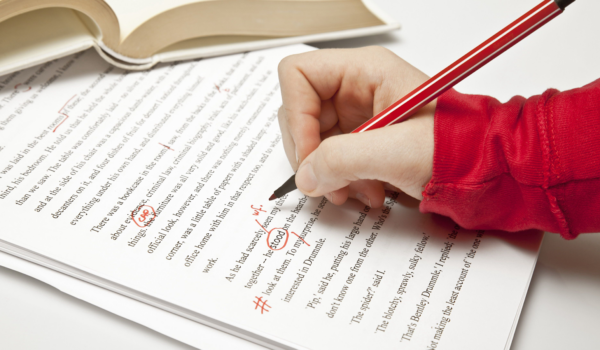
How to Improve Your Writing Skills (Even if You’re Not a Professional Writer)
 Learning how to improve your writing skills is an important way to master practical skills you’ll need throughout your life, even if you don’t consider yourself a good writer.
Learning how to improve your writing skills is an important way to master practical skills you’ll need throughout your life, even if you don’t consider yourself a good writer.
Everyone should have some basic sense of writing skills, even if you’re shooting for a career path that isn’t writing-based. No matter who you are or what you do, you’re always going to need to know how to write emails, reports, cover letters, and other professional documents throughout your career.
Just like food fuels your body, practicing and improving on your writing skills fuels your mind. You don’t just eat one meal to survive – you eat every day to continue nourishing your physical capabilities and live your life. The same thing goes for writing. Even if you’ve been writing essays forever and have a general sense of the skill, you should always want to improve yourself. Fortunately, our writing team at Homework Help Global is the best place to go to for tips and advice to help you get there, and we’re here to help.
Here are some foolproof tips on how to improve your writing skills right from the minds of our brilliant writing team, guaranteed to help you hone in on your skills and produce high-quality written content, no matter what purpose you need it for.

Always Brush up on Your Grammar and Punctuation
The first place you should start when it comes to learning how to improve your writing skills is the English language itself. No matter what your background with the English language is, whether you’ve been speaking English your entire life or you’ve learned it as a second language, there is always room to improve your grammar.
Of course, as a student, your professor is going to be grading you on your use of grammar, but it’s about more than just surface value. Grammar is the backbone of the English language, and it teaches us exactly how to formulate sentences and communicate ideas in a constructive, effective way.
Grammar and punctuation mistakes don’t just impact your ability to write academically – they make you look bad in a professional setting, too. There is nothing more unprofessional and easily avoidable than a typo on a professional product, like a menu or an advertisement.
Take the time to occasionally brush up on your knowledge of grammar and punctuation. Bookmark grammar websites like The Grammar Book or Grammar.com to keep as a reference and a teaching tool. Use an app like Grammarly while you write to help you catch any mistakes in real time. It’s never too late to brush up on these skills, and they will pay off in the long run.
Read Your Way to Better Writing Skills
Yes, you read that correctly – reading more can actually help you learn how to improve your writing skills. The more you read, the more familiar you are with good writing, and the more ideas you’ll get to put your own skills to work.
Read anything you can. Whether it’s a novel, a textbook, or even just news articles, absorb everything you’re interested in reading. The more variety you introduce into your reading schedule, the more well-rounded your own approach will become, and you can start to recognize different types of writing.
When you read, you start to notice the techniques and writing styles that other authors are using. You also start to notice whether those techniques and writing styles work well or not. While reading, if you see something you really like or that stands out to you, make note of it so you can practice it in your own writing.

Work With an Outline
Good writing flows properly, effectively communicates a message, and gives the reader a clear point to follow. How do you make sure that you have good flow and structure? With an outline!
No matter what you’re writing, whether it’s a piece of fiction or an academic essay, use an outline to organize your thoughts before you dive into the writing process. Adding your points to an outline helps you organize the structure and determine which points to focus on, and which order you’ll do this in.
If you’re writing an academic essay, an outline is a great way to track what type of points and evidence you’re going to need from your research. This helps you avoid wasting your time digging through library databases and search engines trying to find an argument that will work.
Additionally, if you run into writer’s block along the way, going back to your outline can be a helpful way to re-motivate yourself or get back into the zone. You’ll be much less likely to get stuck if you have a clear outline that guides the flow of your work.
Read Your Writing as Your Audience
If you want to really learn how to improve your writing skills, you need to be able to visualize yourself as your reader. This is the best way to make sure that you convey your point and that your message is structured well enough to leave a lasting impression.
Read through your work and pretend you’re reading this as an audience member. Ask yourself the following questions:
● Did you give your reader enough information to convey your point?
● Can you visualize your message in your head based on what you’ve written?
● Do your sentences make sense to an outsider or someone with little background information?
● Would you agree with this message if you didn’t write it yourself?
If you can’t answer yes to these questions honestly, it’s time to go through your work and refine your writing.

Keep it Simple
In his essay Politics and the English Language, George Orwell states: “Never use a long word where a short one will do,” and “If it is possible to cut a word out, always cut it out.”
If you’re writing an academic essay, you might be tempted to use a lot of jargon or technical, industry-specific terms to make yourself sound more knowledgeable. However, this can hinder your writing because all of those long, complicated words can distract your reader from the point you’re making. It’s okay to throw in some industry keywords, but try to keep things simple and direct.
The simpler and more direct your sentences are, the easier it is for your reader to understand and absorb your message. This doesn’t mean you have to dumb down your work. It just means you should get to the point clearly. Unless your name is William Shakespeare or J.R.R. Tolkien, there is no need to make your sentences overly complicated or complex.
If you can’t explain something in simpler terms, then you don’t actually understand it that well. The ability to take a concept and explain it to someone else in your own simple words is a sign that you have absorbed and learned that information properly.

Stop Using Cliches
Cliches might sound fun to use, but all that glitter isn’t gold (see what we did there?).
A cliche is an overused phrase, or idiom, that has a general meaning and is usually used in casual conversation. It’s not intended to be taken literally and is usually meant to be metaphorical. Some examples include “every cloud has a silver lining” or “the apple doesn’t fall far from the tree.”
Using cliches will not make your writing any stronger or more descriptive. In fact, it will have the opposite effect. Cliches and overused statements can actually make your writing look lazier or unimaginative. When you’re writing an academic essay, that’s an instant eye roll from your professor. It gives off the impression that you didn’t put much thought into your work, especially when you choose to include a cliche as your opening hook in your introduction.
Not only that, but using cliches can actually hinder your reader’s ability to visualize what you’re saying. Chances are, they’ve already associated that cliche with something else because they have more than likely heard it before in their lifetime. If you want your writing to be memorable and effective, don’t use cliches.
Consider this example from the University of North Carolina Chapel Hill: two applicants have written personal statements as part of their college application. One student uses various cliches, such as “I’m a jack-of-all-trades,” while the other uses specific examples from their background and experience. The student who used the cliches is a less favourable candidate because they didn’t put any originality or personal experience into their writing.
Whenever you’re writing and you find yourself inclined to throw a cliche into your work, stop and think about why you want to use it there and the point you’re trying to make. If you really need to make some kind of comparison or add descriptive words, use a powerful metaphor instead.

Write Now, Worry Later
Remember this: you can always go back and edit your writing to make it better, but if you don’t start writing in the first place you won’t have anything at all to work with. It’s better to have a less than impressive rough draft that you can edit and improve than a blank document. You have to start somewhere.
Write down whatever comes to your head. It doesn’t matter how good it is at this point. Just get something written down and come back to it later on. If you need to write bullet points for now with general ideas, do that. This is a good mindset to get into because it’s much more productive than sitting around waiting for a great idea to come to you.
Set Realistic Goals
Whether you’re learning how to improve your writing skills, trying to get ahead in your schoolwork, or anything else in life, it always helps to set goals. They don’t have to be major goals, like finishing a novel in a week. But they do need to be something productive and achievable. For example, set a goal to write a certain number of words every day, even if you have to sit down and force yourself to do it.
“I’m going to finish my 20-page essay the day before it’s due” is not a realistic goal. However, “I’m going to write 500 words a day starting two weeks before my essay is due” is a productive, realistic goal.
If you make your goal small, like writing a paragraph a day or setting aside 10 minutes a day to write, chances are you’ll end up writing more than you planned once you start going. However, if your goal is smaller, it’s a lot easier to find the motivation to start it.
When writing an academic essay, try breaking your essay down into steps and using those steps as individual goals. For example, one goal can be completing your outline. The next goal can be completing your introductory paragraph. After that, the next goal is writing the first body paragraph, and so on. This is a great way to make the academic writing process a little easier to maintain, and less of a drag to start.

Never Leave Editing Out of the Writing Process
It may be tempting sometimes to just skip the editing process and turn in what you’ve got because you’re so tired of sitting in front of your computer trying to turn out words. However, the editing process is important and should never be overlooked.
Let your work sit for a bit and come back to it with a fresh set of eyes. When you do this, you will almost always come across something that doesn’t read as well or might be more confusing than you intended. This is also an important step in the writing process because this is when you can go over and fine-tune your work, and maybe catch some words that don’t need to be included (like filler words).
Having another set of eyes on your work is also a key step if you have someone available to look over your writing. It’s difficult to look at your own work with a critical lens because it’s something that you created, so you don’t always see those minor errors right away. If you’d like a professional to take a look, you can always use our editing and proofreading services. Our top professional writers will read your work and leave you with some constructive and helpful feedback to make your writing stronger.

Practice Makes Perfect
When it comes to learning how to improve your writing skills, nothing will help you more than practicing. Experience is everything.
If you ask Malcolm Gladwell, it takes about 10,000 hours of deliberate practice to master a skill. That’s the equivalent of nine years of practicing for a minimum of three hours a day! Chances are, you don’t have time for that – no one has that kind of time these days.
Here’s something a little more practical from Josh Kaufman: make a commitment to dedicate a set period of distraction-free time each day to practice working on your writing, and work on reaching those goals we mentioned earlier. For example, tell yourself you’re going to write 500 words a day.
Even if you just practice writing whatever comes to your mind, such as through journaling or writing down your thoughts, this can be helpful. Write something you know you aren’t going to show anyone, and practice working on sentence structure, descriptions, and anything else you’re struggling with. Do this as often as you can to give yourself some more experience in different techniques.
Quick Last-Minute Writing Tips
Need some more ideas on how to improve your writing skills? Here are some quick, digestible tips for improving your writing:
● Get comfortable while writing and choose a spot where you can work without distractions.
● Read your writing out loud. Sometimes we think things make sense on paper, but when we read them out loud they don’t exactly translate the way we think they do.
● Avoid using the passive voice unless you’re specifically required to use it. Active voice is much easier to read and helps you get right to the point.
● Get as many eyes on your work as possible to give you constructive and helpful feedback along the way. Be open to feedback and don’t take it personally if someone gives you a suggestion.
● Go through and remove any fluff or qualifying words such as “very” or “really.” These words don’t add anything of value and usually take away from the main point you’re trying to make.

Don’t Want to Bother Learning How to Improve Your Writing Skills? Let Our Experts Handle it For You
Whether you’re not really interested in learning how to improve your writing skills, or just don’t have the time on your hands, you always have options when it comes to your essays, documents, or other writing projects.
At Homework Help Global, writing is our passion, and each of our writers have spent most of their lives gaining the experience and education necessary to be the best at what they do. We’ve developed the most high-quality, proven techniques for a variety of types of writing projects, from academic essays to resumes and cover letters, speeches, research papers, and so much more.
Get a free quote or fill out the order form now to let the experts take care of all of your writing projects, so you can sit back and relax knowing the best in the business are on the job.
Share:

